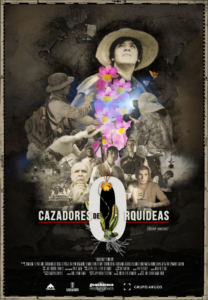-
Wed21Jul2021Fri23Jul2021University of Oxford
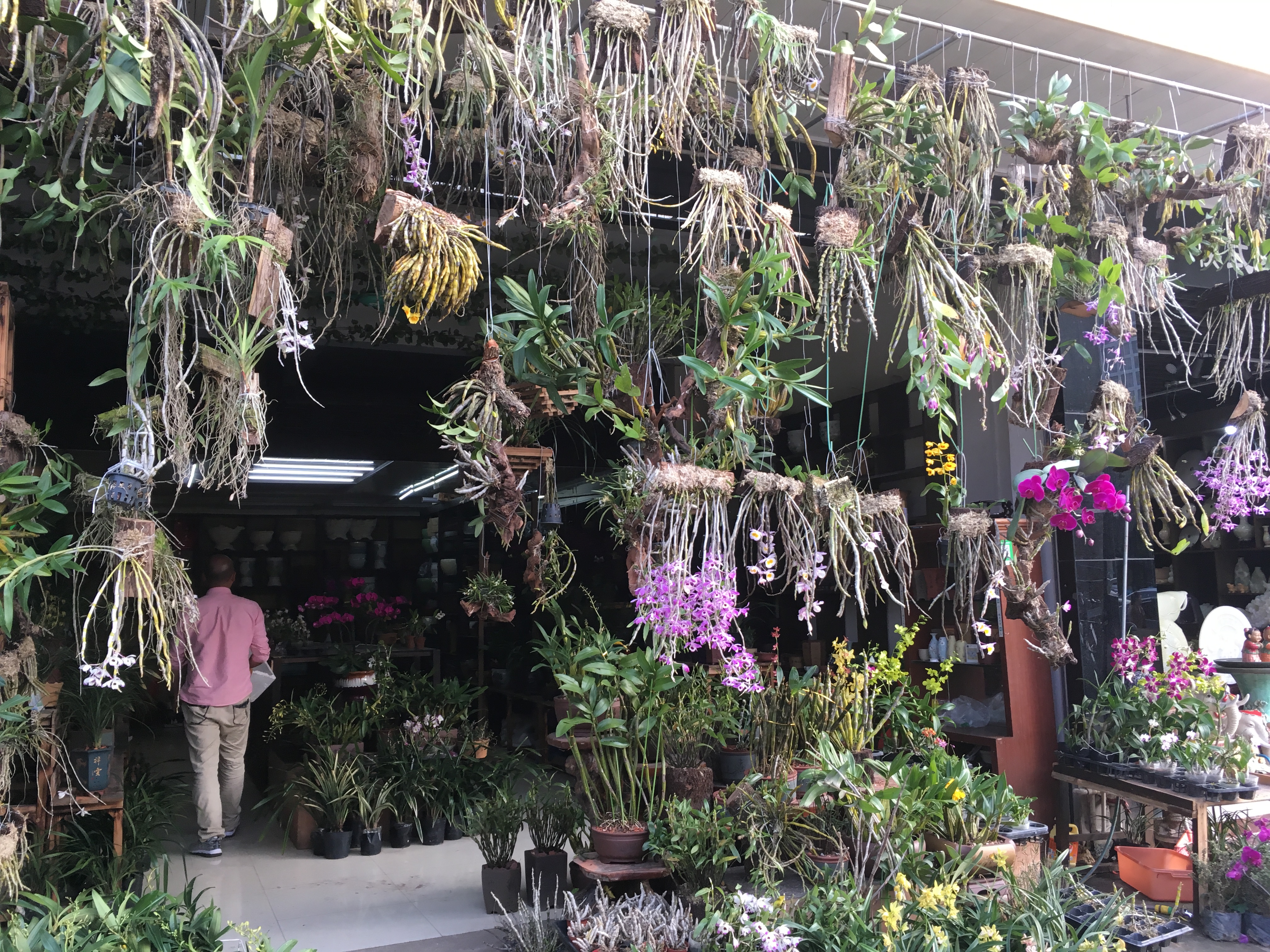
The Interdisciplinary Conservation Network (ICN) event format is one which has been successfully implemented over several years by the Interdisciplinary Centre for Conservation Science. The aim of an ICN is to provide Early Career Researchers (ERCs) with an opportunity to develop collaborative research, while learning key skills for the development of their careers. Through the design, planning and implementation of an ICN, ERCs can build new networks, skills and produce relevant outputs for their research. A few senior researchers will join the event to deliver key capacity-building and mentorship sessions at the workshop.
ICN 2020-21 aims to create a platform for early career researchers, primarily focusing on wildlife trade, to develop and lead their own collaborative research projects, gain useful skills, and build a stronger network. ICN 2020-21 has also served a unique and valuable function during the COVID-19 pandemic by providing a space for participants to meet and collaborate online with colleagues internationally despite travel restrictions – which helps maintain social connectivity between otherwise isolated participants and allows participants to continue their overall career development despite a general dearth in current opportunities.
ICN 2020-21 is organised by the Oxford Martin Programme on Wildlife Trade and the Interdisciplinary Centre for Conservation Science, in partnership with the Wildlife Conservation Research Unit and the Oxford Brookes University Wildlife Trade Research Group. This event showcases the strong and diverse range of research on the unsustainable and illegal wildlife trade being carried out within Oxford and brings the key research groups working on the topic together.
-
Mon14Jun20219:30 amOnline
Following an introduction from Professor Richard Davies, Pro-Vice Chancellor, Global, at Newcastle University, our high profile guests from the CBD Secretariat, UNEP, the UK government, industries and academia will be discussing how we can best harness the UK’s unique expertise in people-oriented conservation science to support the development of principles, policies and practices that meet CBD goals in the UK and partner countries, in an equitable, socially-just and inclusive way.

As part of this event, E.J. Milner-Gulland, Tasso Leventis Professor of Biodiversity at the University of Oxford, Co-Director of the Oxford Martin Programme on Wildlife Trade and founder of the CASCADE initiative, chaired a panel of high-level end-users of academic input on environmental issues.
This event, co-hosted with the All Party Parliamentary Group on International Conservation, was held for the launch of an exciting new partnership among UK higher education institutions (HEIs). This partnership, CASCADE*, aims to use the country’s world-leading expertise in people-focused biodiversity conservation to support the development of principles, policies and practices that meet biodiversity goals in the UK and globally in an equitable, socially-just and inclusive way.
More information on the event: https://www.cascade.ac.uk/events
Watch the launch recording: https://youtu.be/kt79Pc6DEwI
More information on CASCADE: https://www.cascade.ac.uk/
*CASCADE = Conservation and Sustainability Consortium of Academic Institutions
-
Tue19Mar20194:00 pmSeminar Room, Department of Zoology, University of Oxford, 11a Mansfield Road, Oxford OX1 3SZ
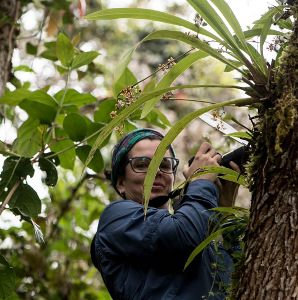 Colombia has the highest number of endemic orchids worldwide and some remain unknown to science. Orchids are flagship species that can help promote Andean forests conservation and ecosystem services but many species are endemic to restricted regions and threatened by rapid habitat loss and low tolerance to climatic changes. While private collectors have impressive ex-situ living collections and abundant natural history data, this information is not currently organized or accessible. The lack of basic knowledge and in-situ conservation status of many species is truly worrisome.
Colombia has the highest number of endemic orchids worldwide and some remain unknown to science. Orchids are flagship species that can help promote Andean forests conservation and ecosystem services but many species are endemic to restricted regions and threatened by rapid habitat loss and low tolerance to climatic changes. While private collectors have impressive ex-situ living collections and abundant natural history data, this information is not currently organized or accessible. The lack of basic knowledge and in-situ conservation status of many species is truly worrisome.This talk aims to communicate an initiative taking place among two Colombian institutions -- The Center for Biological Research and the Colombian Orchid Society -- which is implementing a program for the orchids conservation through in-situ and ex-situ conservation, integrating the use of technology with active participation of communities, including:
- Advancing phylogenomic studies and population genetics in groups with high endemism and diversity in Colombia (Cymbideae tribe, and the genera Lepanthes, Dracula and Masdevallia);
- Implementing a virtual herbarium of living collections and genetic material at Humboldt Institute’s tissue bank;
- Monitoring orchids using technology (provided by a UK NGO, Arribada Initiative) at La Reserva Orquídeas, in Antioquia;
- And understanding the legal and illegal orchid trade in Colombia.
These activities are being carried out through participatory science and will also allow to promote conservation and sustainable use for many species as established by the Colombia Orchid Conservation Strategy.
All welcome to attend this seminar.
Dr Tatiana Arias is interested in the study of Colombian orchid’s genetic biodiversity and conservation. Tatiana has a PhD in Biological Sciences from the University of Missouri and, after graduating, she accepted a two-year postdoctoral fellowship at The University of Hong Kong. Tatiana is now the leader of the Comparative Biology group at The Center for Biological Research (CIB) in Medellin, Colombia. She has recently been awarded the Young Colombian Scientist distinction by the Colombian Academy of Exact, Physical and Natural Sciences and the World Academy of Sciences (TWAS). Tatiana is currently an Oxford Visiting Fellow at the Oxford Martin Programme on the Illegal Wildlife Trade and a trained Plant Scientist.
Follow Tatiana on Twitter: @TatianaAriasGar
-
Mon18Mar20194:30 pmSeminar Room, Department of Zoology, University of Oxford, 11a Mansfield Road, Oxford OX1 3SZ
Orchid Hunters
In the 19th century, a disease spread through the vast tulip crops that supported the Dutch economy. This event triggered a frantic search for wild flowers to supply the fast growing European flower market.
In this documentary, orchid hunters tell the story of hundreds of collectors with scientific interest, like Humboldt or Mutis, or businessmen like Chesterton or Millican, who went to New Granada in search of orchids and documented their trips. Filled with amazing anecdotes, stories of looting, shipwrecks and deaths, these stories are mostly unknown to the public.
The story of orchid hunters in the new world is an historical testimony showing the pillage that tropical forests have been facing. This journey through history is narrated in parallel with the way orchids are grown and studied nowadays.
Documentary in Spanish with English subtitles.
All welcome to attend if registered (free) here: https://iwt-orchid-hunters.eventbrite.co.uk
Please arrive at 16:15 to sign-in before the screening which will start promptly at 16:30. No entry after 17:00.
1-hour screening followed by a 30-minute Q&A session with Dr Tatiana Arias, specialist in Colombian orchid’s genetic biodiversity and conservation.
-
Thu24Jan201912:30 pmLecture Theatre, Oxford Martin School, 34 Broad Street, Oxford
 The illegal wildlife trade undermines our global commitment to protect threatened biodiversity. Being a key destination in Asia, China needs to play a leading role in reducing demand for illegal wildlife products so as to reverse the unsustainable trend. During this talk Ming will discuss ongoing projects that his team are working on from Guangzhou, where they are based, which is widely considered as the epicenter of illegal wildlife trade in Mainland China. He will draw on the team's interdisciplinary approaches to tackle these complex illegal wildlife trade challenges. Partnering with local and international groups (including Oxford Martin Programme on the Illegal Wildlife Trade and Wildlife Conservation Society), they hope to develop data-informed strategies by understanding the domestic trends and drivers of wildlife trade in China, the dynamics of local medicinal and wildlife markets, and the motivation and behaviour of local and overseas Chinese consumers of wildlife products.
The illegal wildlife trade undermines our global commitment to protect threatened biodiversity. Being a key destination in Asia, China needs to play a leading role in reducing demand for illegal wildlife products so as to reverse the unsustainable trend. During this talk Ming will discuss ongoing projects that his team are working on from Guangzhou, where they are based, which is widely considered as the epicenter of illegal wildlife trade in Mainland China. He will draw on the team's interdisciplinary approaches to tackle these complex illegal wildlife trade challenges. Partnering with local and international groups (including Oxford Martin Programme on the Illegal Wildlife Trade and Wildlife Conservation Society), they hope to develop data-informed strategies by understanding the domestic trends and drivers of wildlife trade in China, the dynamics of local medicinal and wildlife markets, and the motivation and behaviour of local and overseas Chinese consumers of wildlife products.To register and for more information: https://www.oxfordmartin.ox.ac.uk/event/2662
To watch the live webcast see below or: https://youtu.be/6XI9RvWHPYw
All welcome to attend this one-hour seminar.
Ming is an Oxford Martin Visiting Fellow on the Oxford Martin Programme on the Illegal Wildlife Trade and a trained conservation scientist. He defended his PhD thesis at the University of California. He completed two fellowships from Columbia and Yale Universities (Earth Institute) and Princeton University (Woodrow Wilson School).
Taking a break from academia, he worked as a data scientist in an NYC educational technology company. In 2017, he started a prestigious professorship position at the Department of Ecology and Evolution at Sun Yat-sen University, China. His team takes interdisciplinary and novel approaches to address illegal wildlife trade and sustainability issues in China.
-
Mon15Oct20184:00 pmOxford Martin School, University of Oxford, 34 Broad Street, Oxford OX1 3BD
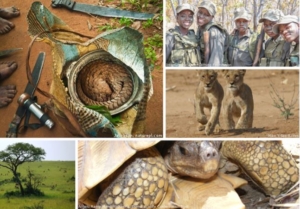 In conjunction with the Africa Oxford Initiative and the Interdiscplinary Centre for Conservation Science, we are pleased to welcome you to our seminar on the Illegal Wildlife Trade in Africa.
In conjunction with the Africa Oxford Initiative and the Interdiscplinary Centre for Conservation Science, we are pleased to welcome you to our seminar on the Illegal Wildlife Trade in Africa.Join us for this unique opportunity to hear from five leading African conservationists who will be talking about their work to halt the illegal wildlife trade on the continent.
Each researcher will be talking about the challenges of carrying out conservation in their countries and the different solutions they are employing to help. Short presentations will be followed by a panel discussion, and the event will close with a poster session and time to meet the speakers.
- Gathering the Evidence for Action: Ghana's Pangolin Trade presented by Kofi Amponsah-Mensah, Centre for African Wetlands, University of Ghana. Find out more here.
- Towards Sustainable Wildlife Conservation: A Case Study of Wildlife Crimes in Two Major Protected Areas and Adjacent Communities in Zimbabwe presented by Edson Gandiwa, School of Wildlife, Ecology and Conservation, Chinhoyi University of Technology, Zimbabwe. Find out more here.
- Decline of the wild ploughshare tortoise caused by its illegal international trade presented by Angelo Ramy Mandimbihasina, Durrell Wildlife Conservation Trust, Madagascar. Find out more here.
- Enhanced Equity and Governance, Reduced Illegal Resource Use at Uganda Protected Areas presented by Medard Twinamatsiko, Mbarara University of Science and Technology, Uganda. Find out more here.
- A Roaring Trade? Traditional Medicine and the Illegal Trade in Wildlife in Southern Africa presented by Vivienne L. Williams, School of Animal, Plant & Environmental Sciences, University of the Witwatersrand, South Africa. Find out more here.
All welcome to attend this seminar. Book your participation here (drinks and nibbles will be available).
-
Tue09Oct2018Zoological Society of London, UK
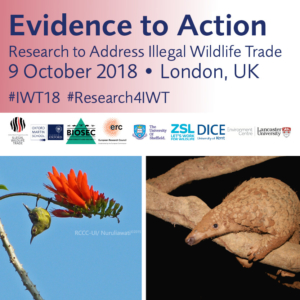 We are thrilled to announce the event, Evidence to Action: Research to Address Illegal Wildlife, jointly organised by Oxford Martin Programme on the Illegal Wildlife Trade (OMP-IWT), BIOSEC University of Sheffield, Lancaster Environment Centre, the Durrell Institute of Conservation and Ecology, the Institute of Zoology (IOZ). The meeting will be held prior to the 2018 London IWT Conference.
We are thrilled to announce the event, Evidence to Action: Research to Address Illegal Wildlife, jointly organised by Oxford Martin Programme on the Illegal Wildlife Trade (OMP-IWT), BIOSEC University of Sheffield, Lancaster Environment Centre, the Durrell Institute of Conservation and Ecology, the Institute of Zoology (IOZ). The meeting will be held prior to the 2018 London IWT Conference.Use #IWT18 and #Research4IWT to spread the word!
The event will bring together researchers and end-users from across all sectors working on IWT, to find new ways of working together to tackle this complex topic. Research plays a central role in finding real-world solutions to the challenges posed by IWT, in ways that are evidence-based, and effective.
Event objectives
- Underline the importance of evidence in effectively tackling IWT and showcase existing research with real-world impact
- Promote cross-sector collaboration to use reliable evidence to increase the effectiveness of IWT actions
- Provide policy-relevant and evidence-based suggestions on how to tackle IWT
Call for Contributions
This Evidence to Action event will cover the full range of areas in which research can support action, explicitly reaching across IWT stakeholder groups to learn from experience and build collaborations that can inform policy and action. We aim to be inclusive and seek a diversity of approaches and perspectives. We are calling for expressions of interest in contributing to the programme of this key event.
Follow @IWTnet on Twitter for updates
Email symposium@illegalwildlifetrade.net for questions about the event
-
Wed27Jun201811:30 amSeminar Room 2, New Radcliffe House, Department of Zoology, University of Oxford, Oxford, UK
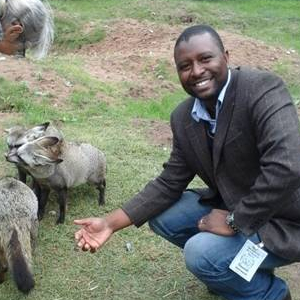 The complexity of contemporary wildlife conservation emanates from the fact that there are different ways in which people perceive conservation issues. Furthermore, there seems to be competing conservation agendas at various at levels from local to global platforms. The existence of different levels of influence and capacities to negotiate and resist or promote certain policy propositions exacerbates this complexity. In most developing countries endowed with wildlife species, it is acknowledged that conservation can be a success if people support conservation goals. Crucially, getting the support of people requires a paradigm shift in attitudes, perceptions and behaviours of both the people living with the resource as well as those responsible for management and decision-making in conservation.
The complexity of contemporary wildlife conservation emanates from the fact that there are different ways in which people perceive conservation issues. Furthermore, there seems to be competing conservation agendas at various at levels from local to global platforms. The existence of different levels of influence and capacities to negotiate and resist or promote certain policy propositions exacerbates this complexity. In most developing countries endowed with wildlife species, it is acknowledged that conservation can be a success if people support conservation goals. Crucially, getting the support of people requires a paradigm shift in attitudes, perceptions and behaviours of both the people living with the resource as well as those responsible for management and decision-making in conservation.In this talk, I will explore a paradigm shift that has occurred in the philosophy of wildlife conservation and how this shapes current and future approaches to conservation, using Zimbabwe as a case study. First, I will give a brief outline of the conservation setting in Zimbabwe and situate it within a conservation science perspective. Second, the role that conservation science can play in answering the following key questions will be explored:
- how conservation sustainability in human mediated landscapes could be attained;
- ways in which conservation beyond biodiversity could be promoted to achieve economic development, poverty alleviation and environmental justice;
- various approaches of engaging corporations and conservationists for partnerships;
- options aimed at jointly maximising conservation and economic objectives to accelerate progress in conservation initiatives.
I will conclude the talk by suggesting strategies that conservationists and practitioners in Zimbabwe could embrace to achieve sustainability.
All welcome to attend this seminar.
Victor K. Muposhi worked as a Teaching Assistant from 2006 to 2009 in the Wildlife Unit of the Environmental Science Dept., Bindura University of Science Education and then as a lecturer in the Wildlife Ecology and Conservation Dept., Chinhoyi University of Technology. Currently he is a staff development fellow with Chinhoyi University of Technology for a Doctor of Philosophy in Conservation Biology. His research is focusing on the molecular and ecological trade-offs of trophy hunting and their implications on conservation of wildlife species in Zimbabwe.
-
Wed02May201811:00 amSeminar Room 2, New Radcliffe House, Department of Zoology, University of Oxford, Oxford, UK
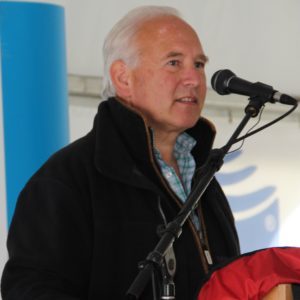
The European Eel has been in decline for well over 100 years however the last 30 as seen a sharp increase and so triggered its endangered status. There are many causes and no silver bullet. Habitat loss is significant especially of Wetlands and here in UK there is only some 20% left. Blocked migration pathways are a big issues with 1.3 million barriers to the rivers of Europe and of course the 25,000 hydropower stations. Over fishing is clearly a cause too and the revelations of early April 2018 of the enormous scale have shocked the eel community – EUROPOL believe 100 tons or 350 million eels are being trafficked annually to Asia. This is one quarter of the annual recruitment. The major countries are France then Spain and Portugal. The Sustainable Eel Group (SEG) aims to create impact for healthy wild eel populations to support their role in aquatic environments and sustainable use for the benefit of communities, local economies and traditions. Please see the SEG’s latest report on eel trafficking for more information on this subject.
Andrew Kerr (Chairman, Sustainable Eel Group) has always had a passion for wildlife – from playing with the monkeys in his family garden in the mid 1950’s in Singapore to today where he champions a sustainable solution to enable the recovery of the critically endangered European Eel. Andrew has a wide range of experience, having been a soldier and grounded in commerce perspectives working for Clarks Shoes and ran his own management consultancy specialising in organisational and management development for 25 years. He became involved in conservation, professionally through U.K.’s Wildlife Trusts where he held Chairman positions for Gloucestershire and then South West. In 2010, after speaking at the UK’s first eel conference, Andrew formed the SEG to bring together Science, Conservation and Commercial interests into one united European wide movement.
All welcome to attend this seminar.
-
Tue30Jan20184:00 pmOxford Martin School, Oxford, UK

Major transnational organized crimes have increased dramatically in the past decade, coincident with increases in legal containerized cargo shipped worldwide. The illegal ivory trade is no exception. Sam Wasser will describe his use of genetic tools to identify the source of Africa’s major ivory poaching hotspots, as well as the number, scale and location of its major ivory export cartels. These tools are enabling law enforcement to target the illegal ivory trade before the contraband enters transit where it becomes far more difficult and expensive to trace.
Samuel Wasser holds the endowed chair in Conservation Biology at the University of Washington, where he is a Professor in the Department of Biology and Director of the Center for Conservation Biology. His lab is world renown for pioneering highly accessible noninvasive genetic and physiological tools for monitoring human impacts on the environment over large spatial scales, including the use of detection dogs. His forensic work is best known for identifying the two major ivory poaching hotpots in Africa. This work involved collaboration with numerous national and international government organizations, including the CITES Secretariat, INTERPOL, the UN Office on Drugs and Crime, US Department of Homeland Security Investigations, US Fish and Wildlife Service, Kenya’s Directorate of Criminal Investigation and the World Bank.
All welcome to attend this seminar.
-
Thu16Nov201711:00 amNew Radcliffe House, Department of Zoology, University of Oxford, Oxford, UK
 In this seminar, Michael Fabinyi will present an overview of his ongoing research on Chinese seafood consumption, focusing on illegal marine wildlife. Based on extensive fieldwork in both China and countries where marine wildlife is sourced, his talk will present: the drivers of consumption of high value marine wildlife in China, the nature of the ‘grey trade’ to China through Hong Kong and Vietnam, the social and environmental effects of trade in marine wildlife in source countries such as the Philippines, and options to improve governance of this trade.
In this seminar, Michael Fabinyi will present an overview of his ongoing research on Chinese seafood consumption, focusing on illegal marine wildlife. Based on extensive fieldwork in both China and countries where marine wildlife is sourced, his talk will present: the drivers of consumption of high value marine wildlife in China, the nature of the ‘grey trade’ to China through Hong Kong and Vietnam, the social and environmental effects of trade in marine wildlife in source countries such as the Philippines, and options to improve governance of this trade.Michael Fabinyi is a Senior Research Fellow at the University of Technology Sydney (UTS). He is an anthropologist with research interests in coastal livelihoods, the role of China in global fisheries, and the social aspects of marine resource governance. He has written a book and more than thirty peer-reviewed articles, and from 2012-2017 was the holder of a Society in Science – Branco Weiss Fellowship. Before moving to UTS in 2016 he was based for seven years at the Australian Research Council Centre of Excellence for Coral Reef Studies at James Cook University. He has held visiting appointments at Peking University (2012-13), WorldFish (2015), and is an Adjunct Associate Professor at Palawan State University, Philippines.
-
Sat07Oct2017Chester Zoo, UK
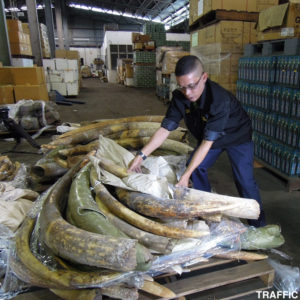 The world is currently dealing with an unprecedented rise in illegal wildlife trade. It is one of the greatest direct threats to the future of many of the world’s most iconic species. The illegal wildlife trade affects thousands of species that are often already highly threatened and in danger of extinction.
The world is currently dealing with an unprecedented rise in illegal wildlife trade. It is one of the greatest direct threats to the future of many of the world’s most iconic species. The illegal wildlife trade affects thousands of species that are often already highly threatened and in danger of extinction.Chester Zoo is putting the spotlight on this lucrative international crime to highlight the devastating impact it's having on threatened species, what's being done to prevent it and how we can all help to make a difference.
The one-day symposium will feature inspiring talks from experts working around the world, including Nafeesa Esmail and Dr Amy Hinsley.
-
Mon25Sep2017Wed27Sep2017St Catherine's College, Oxford, UK
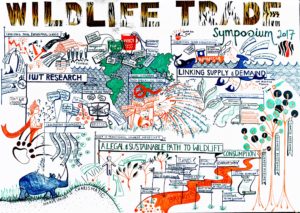 Evolving Perspectives on the Demand for Illegal Wildlife Products, will share new ideas and approaches to better understand and address this challenge, discuss practical and pragmatic possibilities to move forward and bridge the gap between academia and practice. This three-day event is being co-hosted with generous support from San Diego Zoo Global and TRAFFIC.
Evolving Perspectives on the Demand for Illegal Wildlife Products, will share new ideas and approaches to better understand and address this challenge, discuss practical and pragmatic possibilities to move forward and bridge the gap between academia and practice. This three-day event is being co-hosted with generous support from San Diego Zoo Global and TRAFFIC.The symposium will showcase case studies of best practice in understanding and addressing the illegal trade in wildlife products, with a particular focus on products used for medicinal value. Sharing new ideas and approaches for identifying consumers, changing consumer behaviour, and evaluating intervention impact.
This will be an opportunity for people from different backgrounds and institutions who share a common interest in addressing the illegal wildlife trade to connect with one another. This will facilitate learning, raise awareness of potential synergies and collaborations, and catalyse new initiatives and partnerships. The symposium will thereby provide a much-needed opportunity for people to work together more effectively.
-
Tue25Jul2017International Congress for Conservation Biology conference, Colombia
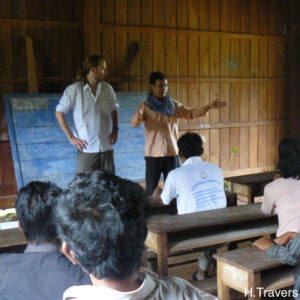
This symposium was held at the 2017 ICCB conference and was organised by Dr Diogo Veríssimo (John Hopkins University) and Professor EJ Milner-Gulland.
The unsustainable trade in wildlife is increasingly recognised a key threat to biodiversity. Efforts to mitigate the impacts of this trade have historically focused on curtailing supply through regulation and enforcement. While the extent of success of such measures is a matter of debate, a consensus has emerged that without a focus on the demand side of the trade, any attempt to limit it to a sustainable level will fail in the long run. As influencing demand for wildlife products entails understanding and changing human behaviour and societal norms, the methods needed are within the realm of the social sciences. This can be a barrier to conservationists, who may not be aware of the potential for different fields to contribute to demand reduction research and intervention.
This Symposium brought together professionals from across the social sciences to showcase approaches used in their fields to influence human behaviours. The speakers covered academic fields such as psychology and economics, whose goal is to better understand human decisions, as well as applied fields such as social marketing, that have a wealth of knowledge on how to design, implement and evaluate behaviour change interventions. By bringing together researchers and practitioners in fields that are still not well integrated within conservation science, this symposium fostered a wider adoption of social science among those working to manage demand for wildlife products. The symposium was also aimed at those interested to influence human behaviour or better integrate social science into their research.
Symposia topics:
- Reducing demand for wildlife: how are we doing?
- Using methods from economics to understand consumer preferences for wildlife.
- Applying social marketing to reducing demand for wildlife - three campaigns experiences.
- Designing positive bear bile reduction campaigns for Chinese tourists.
- Conservation criminology approaches for managing demand for wildlife products.
-
Tue25Jul2017International Congress for Conservation Biology conference, Colombia
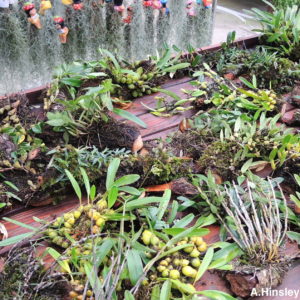 This symposium was held at the 2017 ICCB conference and was organised by Dr Lauren Gardiner (Royal Botanic Gardens, Kew) and Dr Amy Hinsley.
This symposium was held at the 2017 ICCB conference and was organised by Dr Lauren Gardiner (Royal Botanic Gardens, Kew) and Dr Amy Hinsley.Although much conservation attention is paid to charismatic megafauna, one in five of the world’s almost 400,000 plant species is threatened with extinction. Of those, IUCN data shows that more than 20% are directly threatened by collection from the wild for subsistence use or trade, including for food, building materials, medicine and as ornamental plants. Horticultural techniques that have been developed over thousands of years to grow crop plants and living collections in botanical gardens have long contributed to the ex situ conservation of plants around the world. Yet horticulture can also be a threat: many rare plant species have been collected to extinction for the horticultural trade, and encouraging propagation of useful plants is an often suggested solution to over-collection, but one that may actually increase wild-collection.
This symposium brought together experts from research and practice to present experiences and viewpoints, from different disciplines, of the role of horticulture in preventing over-collection of wild plants and securing their representation in ex situ collections. Speakers included anthropologists working on sustainability of subsistence use, botanists and conservationists who specialise in different groups of threatened plants, as well as practitioners who work closely with horticultural traders and corporations using wild plant material.
Symposia topics:
- Are private horticultural collections species' saviours or drivers of extinction?
- Ex situ conservation of succulent plants: examining tensions in horticulture.
- Seed banking and horticulture: complementary tools for the conservation, restoration, and increased genetic diversity of wild plants.
- Horticulture as a strategy for in situ and ex situ orchid diversity conservation in the Andes.
- Can cultivation of the economically valuable Xate palm take pressure off its wild populations?
- Horticultural propagation versus wild collection for commercially viable yields.
-
Tue18Jul201711:30 amNew Radcliffe House, Department of Zoology, University of Oxford, Oxford, UK
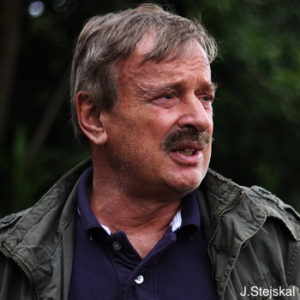 The Oxford Martin Programme on the Illegal Wildlife Trade hosted a special seminar by Karl Ammann at the University of Oxford.
The Oxford Martin Programme on the Illegal Wildlife Trade hosted a special seminar by Karl Ammann at the University of Oxford.Karl Ammann, a conservationist and wildlife photographer, presented some of his investigative work on the illegal wildlife trade. Karl has been working in this field for 20+ years and produced various documentaries on a range of species and products traded internationally, highlighting the lack (and need) of concrete enforcement action. Most of these detailed investigations have involved apes exported from the Congo Basin to China. Richard Hargreaves, a UK based lawyer will also joined him to shed light on some of the legal aspects of these investigations.
-
Mon15May2017Merton Society, London, UK
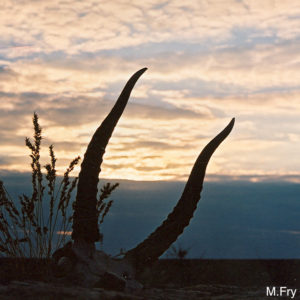 Professor Milner-Gulland spoke about her research on tackling wildlife crime, both through working with local people living around Protected Areas in Africa, and changing consumers' attitudes to wildlife purchases in Asia.
Professor Milner-Gulland spoke about her research on tackling wildlife crime, both through working with local people living around Protected Areas in Africa, and changing consumers' attitudes to wildlife purchases in Asia. -
Wed01Mar2017Cambridge Conservation Forum, Cambridge, UK
 Dr Amy Hinsley discussed the importance of studying consumer demand in the wildlife trade and various methods that can be used for understanding it. In her talk, Amy used case studies of orchids and bear bile to illustrate these approaches.
Dr Amy Hinsley discussed the importance of studying consumer demand in the wildlife trade and various methods that can be used for understanding it. In her talk, Amy used case studies of orchids and bear bile to illustrate these approaches. -
Thu23Feb2017Oxford Martin School, Oxford, UK
 Our societies are increasingly dependent on, and shaped by, our information technologies. We read, watch, communicate, interact, and monitor digitally, both as individuals and in our institutions.
Our societies are increasingly dependent on, and shaped by, our information technologies. We read, watch, communicate, interact, and monitor digitally, both as individuals and in our institutions.As we document and store every conceivable facet of our lives we expose tensions between the availability of information and the freedoms that we enjoy. We rightly expect a level of personal privacy and freedom of expression while, equally justifiably, expecting transparency from our governments and businesses. In practice, we all too often see the reverse.
In this talk, Dr Joss Wright, Research Fellow at the Oxford Internet Institute, examined technologies that seek to assert, resist, or subvert control over information, and assessed the balance of the information we share as individuals and as a society. The talk explored technologies such as the 'dark web' and Bitcoin, that seek to resist traditional observation and control, and the new forms of control introduced by broad-scale gathering of personal data and the algorithms used to act on it.
By understanding the consequences of hiding and sharing information, and the technologies and policies that we use to do so, we take a necessary step towards consciously guiding the shape of the future societies that we wish to see.
You can watch a video recording of the event here.
-
Fri02Dec2016Oxford Martin School, Oxford, UK
 The new research programme at the Oxford Martin School to tackle the multi-billion dollar trade in illegal and unsustainable wildlife products, brings together academics from conservation science, social policy and cybersecurity to tackle the illegal wildlife trade.
The new research programme at the Oxford Martin School to tackle the multi-billion dollar trade in illegal and unsustainable wildlife products, brings together academics from conservation science, social policy and cybersecurity to tackle the illegal wildlife trade.The first research hub of its kind focused on this issue, the Oxford Martin Programme on the Illegal Wildlife Trade will develop new approaches to addressing the trade in illegal products, which is fuelled by rising wealth and social change and facilitated by the growth of the internet. Focusing on consumer behaviour and motivations, the team will collaborate with governments and conservation organisations on the ground to create, test, implement and evaluate the impact of real-world intervention strategies.
Achim Steiner, Director of the Oxford Martin School, said: "I’m delighted to welcome the start of this programme, which tackles one of our greatest conservation challenges. The situation is critical, and the problem is complex in terms of both its ecological and economic impacts. The approach that this team brings is a truly innovative one, and I’m sure that their multi-disciplinary strategy will help to bring the insights and solutions that this issue so urgently needs."
Enabled by a £1 million grant from the School, the programme will tackle a critical threat to biodiversity. The trade in illegal wildlife products is currently estimated to be worth up to $10 billion annually, and continues to grow. Casualties include:
- The western black rhino, which was officially declared extinct in 2011
- Tanzania’s elephant population, which declined by 60% between 2009 and 2014, due to ivory poaching
- Asian black bears, which have declined globally by nearly 50% due to trade in their bile and paws
- China’s pangolins, down by an estimated 94% due to trade for consumption
Compounding the issue is its complexity: legality is often ambiguous and regulation efforts are frequently hampered by corruption. And as species become scarcer, their rarity can make them even more attractive, increasing demand even further.
Rapid economic development has led to a rise in disposable income in many Asian countries, increasing the demand for wildlife products. Widespread internet connectivity, the advent of the ‘dark web’, and advances in transportation mean trading can take place quickly and easily, and on a huge scale. In a recent six week investigation of 280 websites in 16 countries, $10 million worth of online trade in CITES-listed species was found by an international NGO.
“It is possible for a pangolin to be hunted in the forest of Gabon one day, and sold in a wildlife market in Guangzhou the next,” said Programme Co-Director Professor E.J. Milner-Gulland. “This interconnectedness facilitates and reinforces the rapid, global exchange of information so that trade in wildlife is now possible on a scale, and at a speed, that is unprecedented. Any exploitable species is now at risk.
“Tackling this issue requires a new research approach that takes stock of the complexity of the problem and the pace of developments, and integrates with the needs of practitioners in the real world.”
Despite recognition of the scale and urgency of the problem, current research on the wildlife trade is sparse and often uncoordinated, and conservation has tended to focus on controlling illegal poaching. Recently, there has been recognition of the importance of understanding demand for wildlife products, but there is still limited evidence on what works to change consumer behaviour. The team will focus on wildlife product sales in Asia, with an emphasis on luxury and medicinal uses, and say the very developments that are driving increased sales – social change and new technology – will also be key to tackling the problem.
Programme Co-Director Joss Wright said: “Many newly wealthy people in these markets are young and spend a lot of time online. They may be more interested in high-end lifestyle brands and celebrity culture than traditional wildlife products, and social media means they will also be more exposed to environmental and ethical campaigning.
“Developments in cyber security also offer hope: traders might be increasingly sophisticated in their use of the web, but there’s also a great deal of scope for new methods of law enforcement.”
Crucial to success, the team say, is providing the evidence and approaches which governments, NGOs and international law enforcement agencies can use to support large-scale action.
“We have a real vacuum here when it comes to data and case studies,” said Programme Co-Director Professor Paul Montgomery. “Interventions in consumer behaviour need to be based on solid evidence, thoroughly tested and then monitored for effectiveness. The danger otherwise is that huge amounts of money and time will be spent, with little impact in return.”
You may download the Programme Launch Report here.
Join & Contact us
11a Mansfield Rd
Oxford OX1 3SZ
Twitter feed is not available at the moment.


